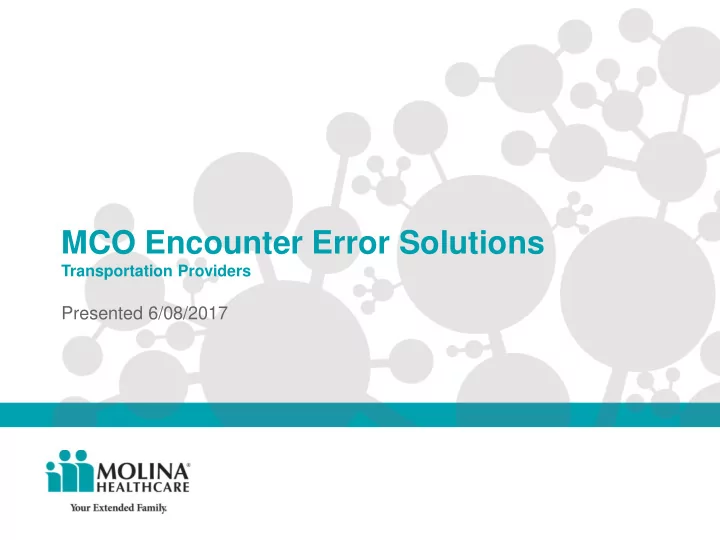

MCO Encounter Error Solutions Transportation Providers Presented 6/08/2017
Transportation Provider Billing Guidelines Agenda • Emergent and Non-emergent Services and HCPCS codes • Appropriate Taxonomies by Service Rendered • Reimbursable Services by Transportation Type • Other Billing Criteria to Consider • Claim Submission Guidelines 2
Transportation Provider Billing Guidelines Transportation provider services are classified as “emergency” or “non- emergency” and both may be comprised of ambulance and helicopter/fixed wing transports, while non-emergency transportation (NET), includes medicar, taxicab, service car, private automobile, bus, train, and commercial airplane transports. 3
Emergent Services and HCPCS codes 4
Non-emergent Services and HCPCS codes 5
DHS Civil Commitment Services and HCPCS codes DHS Civil Commitment Services refers to the contract held between limited authorized providers that transport beneficiaries who have certain behavioral health needs which require the use of a specialized safety car or ambulance. 6
Allowable Categories of Services and Taxonomies 7
Reimbursable Services by Transportation Type Private Auto: – Mileage only Taxicab: – Base rate established – Loaded mileage rate – Additional passenger(s)/attendant Service Car: – Base rate established – Loaded mileage rate – Additional passenger(s)/attendant Medicar – Base rate established – Loaded mileage rate – Use of a hydraulic or electric lift or ramp, wheelchair lockdowns – Additional passenger(s)/attendant 8
Reimbursable Services by Transportation Type (continued) Stretcher Van: – Base rate established – Mileage rate – Transportation by stretcher (when the patient’s condition does not require medical supervision, medical equipment, the administration of drugs or the administration of oxygen, etc.) – Additional passenger(s)/attendant Ambulance (ALS or BLS, Specialty Care Transport (SCT)/Critical Care Transport (CCT) ): – Community rate or maximum rate established – Loaded mileage rate – Additional passenger(s) – Oxygen Helicopter / Fixed Wing: – Community rate or maximum rate established – Loaded mileage rate (only reimbursable for Medicare programs, bundled in base rate for Medicaid programs) – Additional passenger(s) – Oxygen (only reimbursable for Medicaid programs, bundled in base rate for MMAI program) Unique or Exceptional Modes of Transportation: – Negotiated rate with MCO (“Loaded Mileage” is whenever the vehicle is carrying passengers. Loaded miles do not include deadhead miles which are miles the vehicle travels empty going to load the passenger(s) or travels empty between loads or travels empty when returning to home base after unloading the passenger(s) hauled.) 9
Other Billing Guidelines Medicaid (ICP, FHP, ACA) reimbursement methodology: • Base rate reimbursement is determined by the county in which the provider is, or the providers are, based / registered. Medicaid Medicare Alignment Initiative (MMAI) reimbursement methodology: • The Centers for Medicare and Medicaid Services (CMS) publishes guidelines regarding the National Breakout of Geographic Area Definitions by Zip Code in order to determine “urban” and “rural” county designations to identify the appropriate rates for one-way trips both greater and less than 17 miles. Determination will be made based upon the pick-up locations for Members. Transportation providers billing with a GY modifier for services which are not medically necessary or are a non-covered service will not be covered under Medicare, but may qualify for NET reimbursement via Medicaid. Otherwise beneficiaries may be responsible directly for payment. Oxygen: • Oxygen usage is a covered service when medically necessary and administered in the transport of a patient by ambulance, helicopter or fixed wing. The use of oxygen in non- emergency transports is a covered service when medically necessary and approved. 10
Other Billing Guidelines (continued) Additional Attendants/Passengers: • Anytime more than one passenger is transported in the same vehicle for any portion of a trip, the transportation provider may only charge mileage for the first passenger, even if the passengers have differing MCOs. Allowable ancillaries, such as attendants, if provided, may be charged for each passenger. • Allowable ancillaries, if provided, may be charged (base rate only) for each passenger. • Mileage may only be charged for the first passenger picked up. If first passenger is dropped off and additional passengers remain to a different destination, additional miles may be billed. • The use of an attendant in the transport of a patient by a medicar, service car, or taxicab is a covered service when medically necessary and approved. Attendants may be billed to respective MCOs if multiple passengers have differing enrollment. • Anytime more than one passenger uses an attendant and the passengers are eligible for different plans, each plan may be billed if multiple attendants are used. Air Transport: • Helicopter transportation providers who own the helicopter and provide their own transport team, will be reimbursed at a maximum rate per trip or the usual and customary charges, whichever is less. • Medical emergency helicopter/fixed wing services must be indicated with a “Y” in box 24C, Loop 2400 SV1- 09 • If a hospital provides the transport team but does not own the helicopter, equally divide the established reimbursement rate or the usual and customary charges of the providers, whichever is less, between the hospital and the helicopter provider. • Oxygen is only reimbursable for Medicaid programs and is considered bundled in base rate for MMAI program. • Loaded mileage rate is only reimbursable for Medicare programs and is considered bundled in base rate for Medicaid programs. Medicaid will pay mileage for Medicare crossover claims. 11
Other Billing Guidelines (continued) What other billing guidelines should Providers take note of? • Emergency helicopter transportation claims that are denied because the patient’s condition does not meet medically-necessary criteria may be reimbursed at the appropriate ground rate. • Anytime more than one passenger is transported in the same vehicle for any portion of a trip, the transportation provider may only charge mileage for the first passenger, even if the passengers have differing Managed Care Organizations (MCOs). If first passenger is dropped off and additional passengers remain to a different destination, additional miles may be billed. • Members receiving mental health Screening, Assessment and Support Services (SASS) are eligible for transportation services. 12
Claim Submission Guidelines 13
Claim Submission Guidelines (continued) 14
Recommend
More recommend